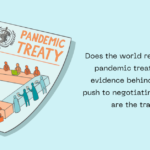
While two cases have been confirmed in the province, “it’s not something you can acquire if you go to the grocery store or go on public transportation.”
Quebec health officials confirmed Thursday evening the province’s first two cases of monkeypox and said it’s investigating 20 other suspected cases.
It’s the only known outbreak in Canada of the rare disease, which can cause painful pustules, scabs and skin lesions.
Earlier Thursday, Montreal public health director Dr. Mylène Drouin said 17 suspected cases of monkeypox in the city were being investigated and authorities were putting protective measures in place, but stressed that all cases so far have been minor and there is no cause for alarm. Most patients recover within a few weeks.
“We do not have to panic at this time. It’s not something that’s going to go to sustained community transmission,” she said. “It’s not something you can acquire if you go to the grocery store or go on public transportation.”
The disease is spread primarily through close, sustained contact, which includes but is not limited to sexual contact, Drouin said. It can be transmitted via respiratory droplets, as well as contact with open sores or bodily fluids. Contacts considered at risk are those who live in the same household with an infected person, or who have had sexual relations with someone who has had the disease.
To date, 15 suspected cases have been identified on the island of Montreal, as well as one on the South Shore and one on the North Shore. The infected are mainly men who had sexual relations with other men, between the ages of 30 and 55.
Drouin stressed that monkeypox is not known to be a sexually transmitted disease and warned against stigmatizing a particular segment of the community, as anyone can catch the virus.
The first suspected cases in Montreal were declared on May 12 at clinics specializing in sexually transmitted diseases. The cases were initially thought to be chancroid, a rare disease that causes painful genital ulcers.
It wasn’t until Tuesday, when authorities learned of a possible case from the United States who had travelled to Montreal, that monkeypox was suspected. Several of the cases in Montreal have been linked to a traveller who came from Boston.
Montreal’s cases have not yet been confirmed by a laboratory, but Drouin said recent outbreaks in Europe and a case reported in the United States suggest they’re probably cases of the virus. Lab results are expected by this weekend.
Monkeypox is typically limited to Africa, and rare cases in the United States and elsewhere are usually linked to travel there. This month, five confirmed or suspected cases have been reported in Portugal, nine in the U.K. and more than 20 in Spain.
Monkeypox typically begins with such symptoms as fever, headache, backache and fatigue, then progresses to a rash on the face and body. The Public Health Agency of Canada says the swelling or enlargement of lymph nodes that accompanies monkeypox distinguishes it from smallpox.
The incubation period is seven to 17 days and most infections of monkeypox last two to four weeks, the agency says. Montreal officials said there is no treatment available in Canada at this time.
The first symptoms of the disease that were identified in Montreal have been traced back to April 29. People who have been in contact with a suspected case will not have to isolate, but they are asked to monitor for symptoms for 21 days and go to a doctor if they suspect they have contracted the disease. Health workers in contact with possible cases are advised to wear full protective gear, including a gown, N95 mask and gloves.
The Public Health Agency of Canada notes that the smallpox vaccine protects against monkeypox. Since that vaccine was routinely administered to Canadians born before 1972, only those who are in their 50s or older may have protection. The World Health Organization reports that the original smallpox vaccine was found to be 85 per cent effective against monkeypox.
Some people who have been in contact with cases in the U.K. have received a smallpox vaccine as protection, and in the U.S. there are monkeypox treatments available for sale. Drouin said the decision on whether those treatments will be taken here depends on availability of the vaccine and drugs, and will be made on a provincial and federal level.
The Massachusetts Department of Public Health reported Wednesday that it had confirmed the first U.S. case of monkeypox virus infection of 2022. The individual is an adult male who recently travelled to Canada, it said.
Monkeypox was discovered in 1958, when two outbreaks occurred in colonies of monkeys being kept for research, the U.S. Centers for Disease Control and Prevention notes. The first human case was found in the Democratic Republic of the Congo in 1970, and since then cases have been recorded in several central and western African countries. In Africa the disease has been known to cause death for as many as one in 10 people who get it.
Drouin said the strain of the disease that is circulating in Montreal appears to be the less severe of the two types that exist. None of the 17 people suspected to be infected in Montreal had to be hospitalized, she noted, with the exception of one man who was admitted for other health problems.



